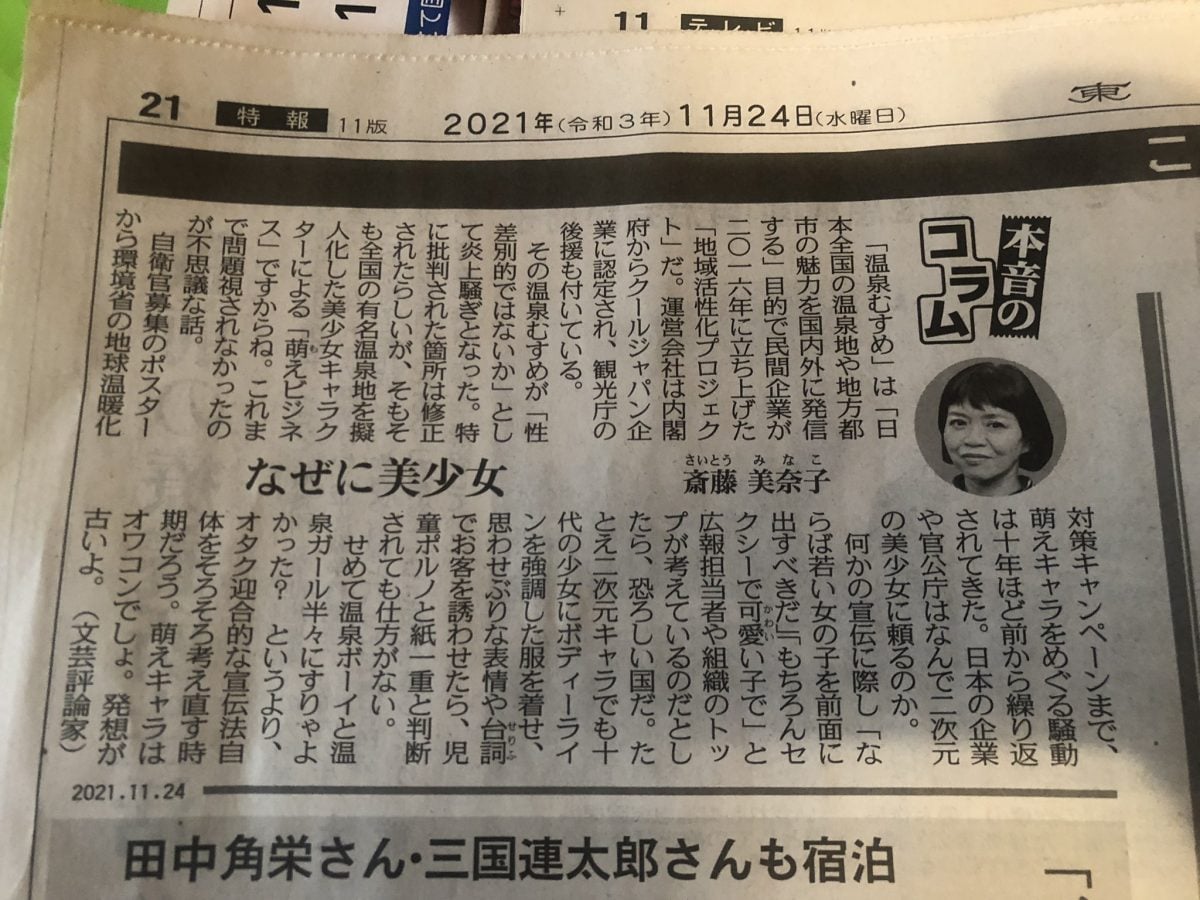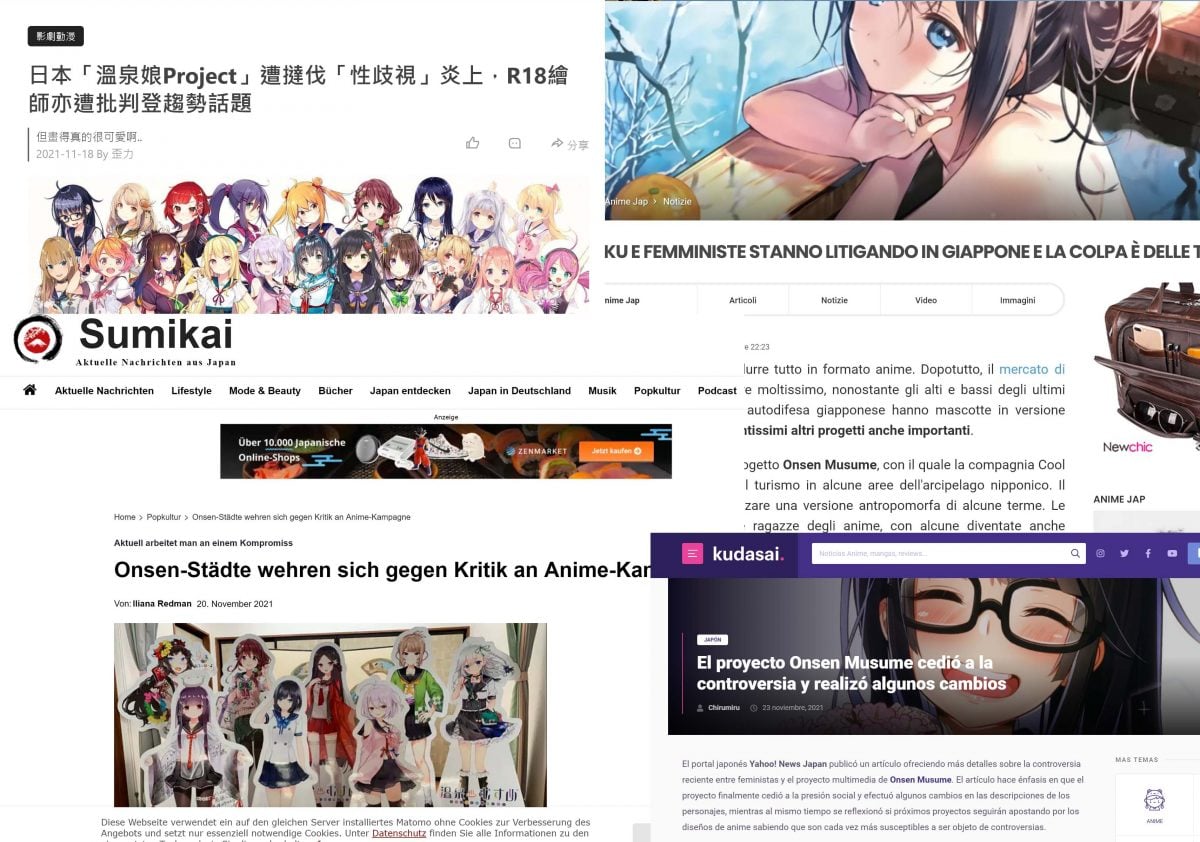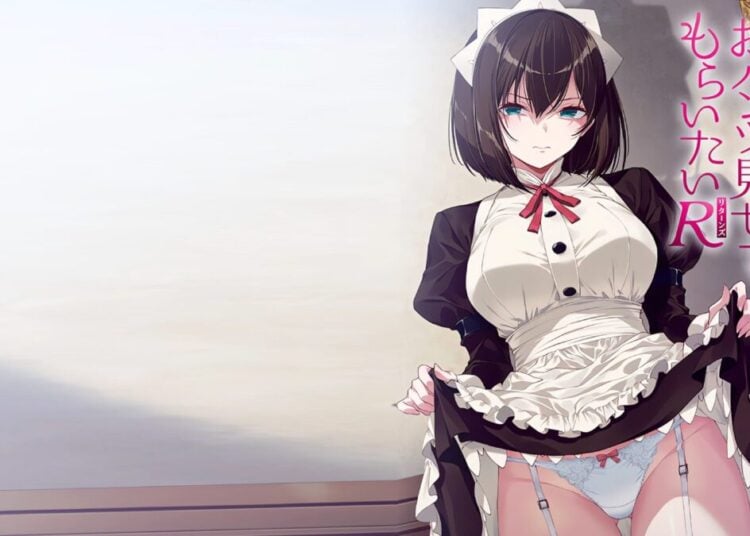When the Onsen Musume Project was first launched in 2016, as a Cool Japan initiative to revitalize the country’s hot springs and their communities through anthropomorphized characters who also act as idols, few expected this to succeed as well as it has. Recent controversies, however, have stirred concerns of censorship in the name of acceptability. According to a November 24th article on ITMedia, the program has come under fire for being allegedly “sexist and sexually exploitative”, which could lead to calls for more restrictive regulations, as endorsed by the article’s author.

Despite the support of the Japanese government, with its various girls being selected as “representative content” alongside Pokémon and Hello Kitty in the National Tourism Organization’s “Your Japan 2020” campaign, it has been forced to “change the character settings” and “delete the names of supporting companies” due to public outcry. According to the Japanese blog Yaraon! and Spain-based Akibamarket.com, this can be traced back to feminist activist Yumeno Nito, founder of Colabo and Tsubomi Cafe. In a series of tweets starting from November 14th, she expressed horror and disgust with what’s described as characters “in sensual and daring poses, with appearances of underage students and drinking alcohol, characters of curative medicine, underage students who yearn to be sensual adult women, and so on.” She further decried what she deemed the “exploitation of young girls.”
https://twitter.com/colabo_yumeno/status/1460060377379602434
Even after Onsen Musume made corrections and changes the following day, Nito continued doubling-down by rebuking the company, and anyone associated with it, for promoting such allegedly bigoted content:
They seem to have surreptitiously removed the sexist and sexually exploitative expressions and the middle school setting that I pointed out yesterday, but the more I look at it, the more I see that the characters are shaped by men’s desires: exposed skin, bare uniforms, flushed cheeks, swollen breasts, unnatural shadows on skirts that reveal the pubic region. Whether her breasts are large or small, her looks, her body, her personality, and her hobbies consume her sexually.
This sparked further outrage and harassment of participating onsens, which were already strained from dealing with COVID-19. As reported by SoraNews24, Yubara Onsen’s official Twitter account released a statement not only condemning such attacks against itself and other cooperating groups but also threatening legal action.
一部のSNSによるコメントなどについて
協力店・個人などにいたずら電話、悪意ある口コミ、侮辱、差別など各種棄損に当てはまる事態が発生しています。実害が続くと弁護士と相談し、業務妨害並びに名誉棄損を視野に入れた法的措置を行います。
ネチケットを重視し、お楽しみください。
— 湯原温泉「温泉むすめ」公式 (@yubarasawa) November 17, 2021

Further exasperating the issue is how other activists, including members of the Japan Communist Party, have jumped on the outrage bandwagon. This is likely connected to the party’s trend towards endorsing peer-pressure censorship to combat the “commercialization of sex and sexual exploitation that degrade women’s sexuality.” One senior member criticized those opposed to Onsen Musume’s critics as “perpetrators who promote sexual crimes”, while another tried to downplay the harassment due to how “social pressure does not constitute legal regulation.”
As the ITMedia article revealed, these developments are happening as Japan is working on the United Nations’ Sustainable Development Goals on the national level. A major concern is that Onsen Musume, being representative content, could draw the UN’s ire over allegations of child pornography. The article’s author not only interprets this in a very broad sense but also presents it as near-inevitable:
As a matter of fact, the 16th goal of the SDGs, “Peace and Justice for All,” clearly states, “Eliminate the abuse, exploitation, trafficking, and all forms of violence and torture against children. Most Japanese may think that “there are countries in the world that lag behind,” but from the perspective of the United Nations, which adopted the SDGs, this is actually directed at Japan.
In Japan, illustrations such as a girl in a sailor suit wearing a mini-skirt that almost reveals her breasts and underwear are greeted with “cute!” In other words, it is “child pornography” that encourages the sexual exploitation of children, of which there are an estimated 1.8 million [cases] worldwide.
It should be noted that among the potential foundations for such claims is the UN Committee on the Rights of the Child’s vague, yet sweeping recommendation in 2007 to “criminalize the production, distribution, dissemination, provision, sale, access, viewing and possession of images and depictions of children, or persons depicted primarily as children, engaged in explicit sexual acts”, which coincidentally bears more than a passing resemblance to the infamous Bill 156 pushed by ex-Tokyo Governor Shintaro Ishihara a few years later. If Japanese officials and firms pursue such measures, as interpreted if not fabricated by activists, these could potentially cripple freedom of expression at the whims of ideologues wrapping their ideas as “global norms”.

External pressure and the vocal efforts of activists in recent times have stoked growing concerns, even beyond Japan, with some comparing the affair to Western cancel culture. Yet within the country, the backlash has not gone without significant opposition. In addition to onsen operators refusing to back down, otaku and other fans have banded together in solidarity, with the hashtag #温泉むすめありがとう, translating as “Thank you, Onsen Musume,” gaining traction to an even more significant degree than the outrage. The company and its affiliates have expressed sincere gratitude, remaining resolute in spite of the outrage.
https://t.co/MSEaYRhhvA
The writer of this article analyzed the internet drama of onsen musume from the perspective of tweet trend.
Numerically,the advocacy or affirmative group of onsen musume is larger than critical group.Of course that fact do not prove we're right. pic.twitter.com/NaSG2cuCyc
— <レイフォース> (@rayforcegame) November 24, 2021
This isn’t to ignore Japanese feminists who have come to the defense of Onsen Musume. Academic Takeyoshi Takamura lambasted those supposedly against sexism for helping enable attempted crime against onsen operators. Feminist_tokyo, on the other hand, commended the owners and otaku for managing to turn a campaign of censorship into a “great victory” that’s raising awareness of Japan’s hot springs. She also rebukes Yumeno Neto and those like her by pointing out how Onsen Musume’s material “does not contain even one millimeter of the intention to mock or ridicule women“, and that the explanations given are little more than excuses for pointless anger. She criticized the ITMedia article for its incendiary approach and bias.
簡単に言うと、
「とにかく説明が絶望的に足りない」
のです。怒りの感情でも何でもいいのですが、とにかく相手に伝える努力や工夫をしましょう。
本当に本気怒っていて、本気で何かを変えたいと思っているのでしたら、なおさらですね。— フェミトー@feminist_tokyo (@feminist_tokyo) November 22, 2021
While there’s much hyperbole once again about the death of anime or Japan being doomed to embrace political correctness, it’s far too premature to sound the alarms just yet. You can bet that Japanese creators, fans, and companies alike aren’t taking such challenges lying down.














